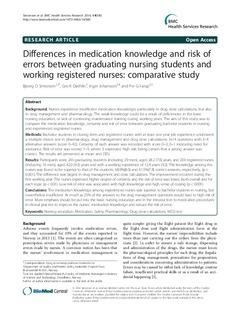| dc.description.abstract | Background:
Nurses experience insufficient medication knowledge; particularly in drug dose calculations, but also in drug management and pharmacology. The weak knowledge could be a result of deficiencies in the basic nursing education, or lack of continuing maintenance training during working years. The aim of this study was to compare the medication knowledge, certainty and risk of error between graduating bachelor students in nursing and experienced registered nurses.
Methods:
Bachelor students in closing term and registered nurses with at least one year job experience underwent a multiple choice test in pharmacology, drug management and drug dose calculations: 3x14 questions with 3–4 alternative answers (score 0–42). Certainty of each answer was recorded with score 0–3, 0–1 indicating need for assistance. Risk of error was scored 1–3, where 3 expressed high risk: being certain that a wrong answer was correct. The results are presented as mean and (SD).
Results:
Participants were 243 graduating students (including 29 men), aged 28.2 (7.6) years, and 203 registered nurses (including 16 men), aged 42.0 (9.3) years and with a working experience of 12.4 years (9.2). The knowledge among the nurses was found to be superior to that of the students: 68.9%(8.0) and 61.5%(7.8) correct answers, respectively, (p < 0.001). The difference was largest in drug management and dose calculations. The improvement occurred during the first working year. The nurses expressed higher degree of certainty and the risk of error was lower, both overall and for each topic (p < 0.01). Low risk of error was associated with high knowledge and high sense of coping (p < 0.001).
Conclusions:
The medication knowledge among experienced nurses was superior to bachelor students in nursing, but nevertheless insufficient. As much as 25% of the answers to the drug management questions would lead to high risk of error. More emphasis should be put into the basic nursing education and in the introduction to medication procedures in clinical practice to improve the nurses’ medication knowledge and reduce the risk of error. | |
